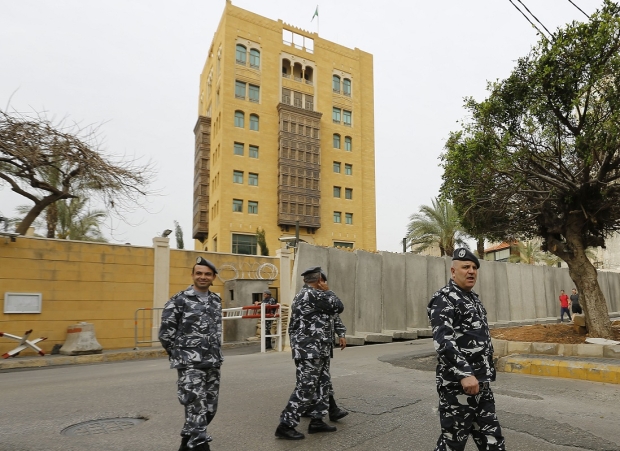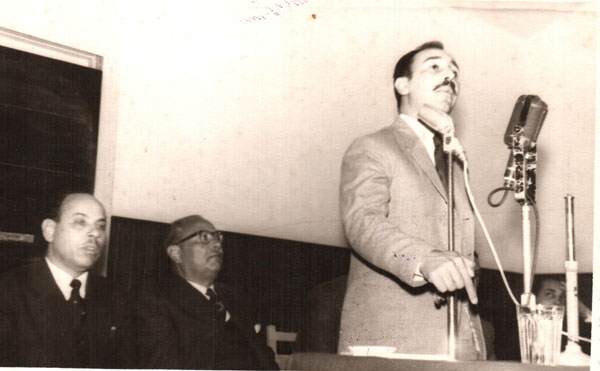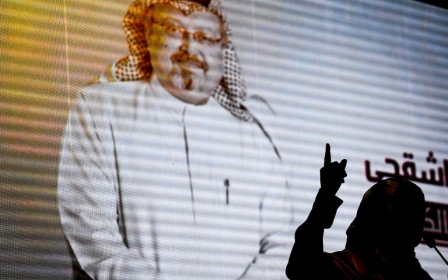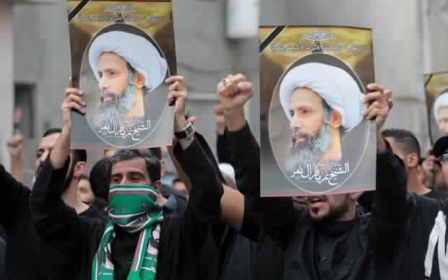Saudi dissident in Beirut believes he escaped same fate as Khashoggi

BEIRUT - Three and a half months after the Saudi journalist Jamal Khashoggi was murdered inside his country’s consulate in Istanbul, a Saudi dissident has come forward alleging that he was similarly lured into the Gulf country’s embassy in Lebanon - and would have also met a gruesome end had he not been accompanied by bodyguards.
Maan al-Jaraba, the leader of the Saudi opposition group Harakat al-Karama (Movement for Dignity), spoke to online news outlet Lebanon Debate about the trap purportedly set up against him in September - only days before Khashoggi’s assassination.
Jaraba belongs to an influential Sunni family, descended from the tribe of Shammar, one of the largest Arab confederations in the Gulf, and linked to the al-Saud dynasty through marriage. However, he has been an open advocate for the establishment of a Saudi constitution and a democratic electoral system.
He claims to follow the teachings of Saudi sheikh Nimr Baqir al-Nimr - a high-profile Shia cleric who called for peaceful reform in the kingdom before being beheaded by Saudi authorities in early 2016 - as well as being a vocal supporter of the ideas of the former Egyptian president Gamal Abdel Nasser.
The source, who requested anonymity, said the events occurred ten days before Khashoggi was killed in Turkey on 2 October 2018.
Much like with Khashoggi, Saudi authorities reportedly told Jaraba they wanted to speak with him to convince him to return to Saudi Arabia.
“After years of being blacklisted, Sheikh Maan was contacted by Saudi embassy officials in Beirut. They said they were ready to engage in talks to bring him back into the fold,” the source said.
A meeting with the embassy officials
A few phone conversations later, the official in charge of negotiations suggested they meet to work out the details. Jaraba agreed, stipulating however that the meeting be held in a neutral public place, such as a restaurant or cafe.
The embassy officials who welcomed him were surprised to see bodyguards present. They thought the sheikh would come alone
- A source close to Maan al-Jaraba
“They talked about it at length and eventually scheduled a meeting in a building in Beirut belonging to the Saudi embassy,” the source told Middle East Eye.
On the day of the appointment, Jaraba drove to the chosen meeting place accompanied by three armed bodyguards. A more substantial security force was also on call nearby.
“The embassy officials who welcomed him were surprised to see the bodyguards,” MEE’s source said. “They thought the sheikh would come alone, though they themselves were heavily guarded.”
Jaraba’s interlocutors tried to convince him to return to Saudi Arabia, where they said he would be “free” to pursue his work. They criticised his “pro-resistance” stance against Israel, as well as the support they believed he was receiving from Iran, which they claimed was damaging to both the kingdom and its reputation.
After praising the “reforms” undertaken by the kingdom’s rulers, in particular those of the Crown Prince Mohammed bin Salman, they urged Jaraba to join the crown prince in his efforts to build a “Saudi Arabia of tomorrow” - an offer the dissident unsurprisingly turned down. The meeting concluded with promises of further appointments and talks.
“After what happened in Istanbul, Sheikh Maan’s associates were convinced he narrowly escaped a similar fate,” the same source said. “He didn’t trust them, so he took the precaution of going to the meeting with bodyguards. This is probably what saved him”.
He didn’t trust them, so he took the precaution of going to the meeting with bodyguards. This is probably what saved him
- A source close to Maan al-Jaraba
After Khashoggi’s murder, all contact between Jaraba and the Saudi embassy in Beirut came to an end.
The abduction of Nasser al-Saeed
A number of Saudi government opponents live in the Lebanese capital, which is also home to the headquarters of Al-Nabaa, a television channel run by London-based Saudi Shia activist Fouad Ibrahim.
Forty years ago, Beirut witnessed the kidnapping of one of the Saud dynasty’s most outspoken critics: writer Nasser al-Saeed, whose writings included a seminal history of the house of Saud.
The dissident writer disappeared for good after being abducted by Saudi agents on 17 December 1979, in a kidnapping straight out of an espionage thriller.
At the time, Lebanon was in the throes of civil war; Saudi Arabia was reeling from the seizure of the Grand Mosque by Juhayman al-Otaibi and few dozen armed insurgents; and an uprising of the kingdom’s Shia minority was underway in the east.
Saeed, who was based in Damascus, had travelled to Beirut for a series of interviews with Arab and Western media when he was reportedly drugged and abducted in broad daylight in the city’s famous Hamra district.
Saudi agents had allegedly received help from Abu al-Zaim, a senior representative of Yasser Arafat’s Fatah movement.
The Saudi dissident was taken to Beirut airport and put on a plane bound for Saudi Arabia. Unconfirmed reports say Saeed was thrown from the plane at an altitude of ten thousand feet. His body was never found.
- The article is based on an a translation of a story that was originally published by Middle East Eye's French website.
New MEE newsletter: Jerusalem Dispatch
Sign up to get the latest insights and analysis on Israel-Palestine, alongside Turkey Unpacked and other MEE newsletters
Middle East Eye delivers independent and unrivalled coverage and analysis of the Middle East, North Africa and beyond. To learn more about republishing this content and the associated fees, please fill out this form. More about MEE can be found here.







